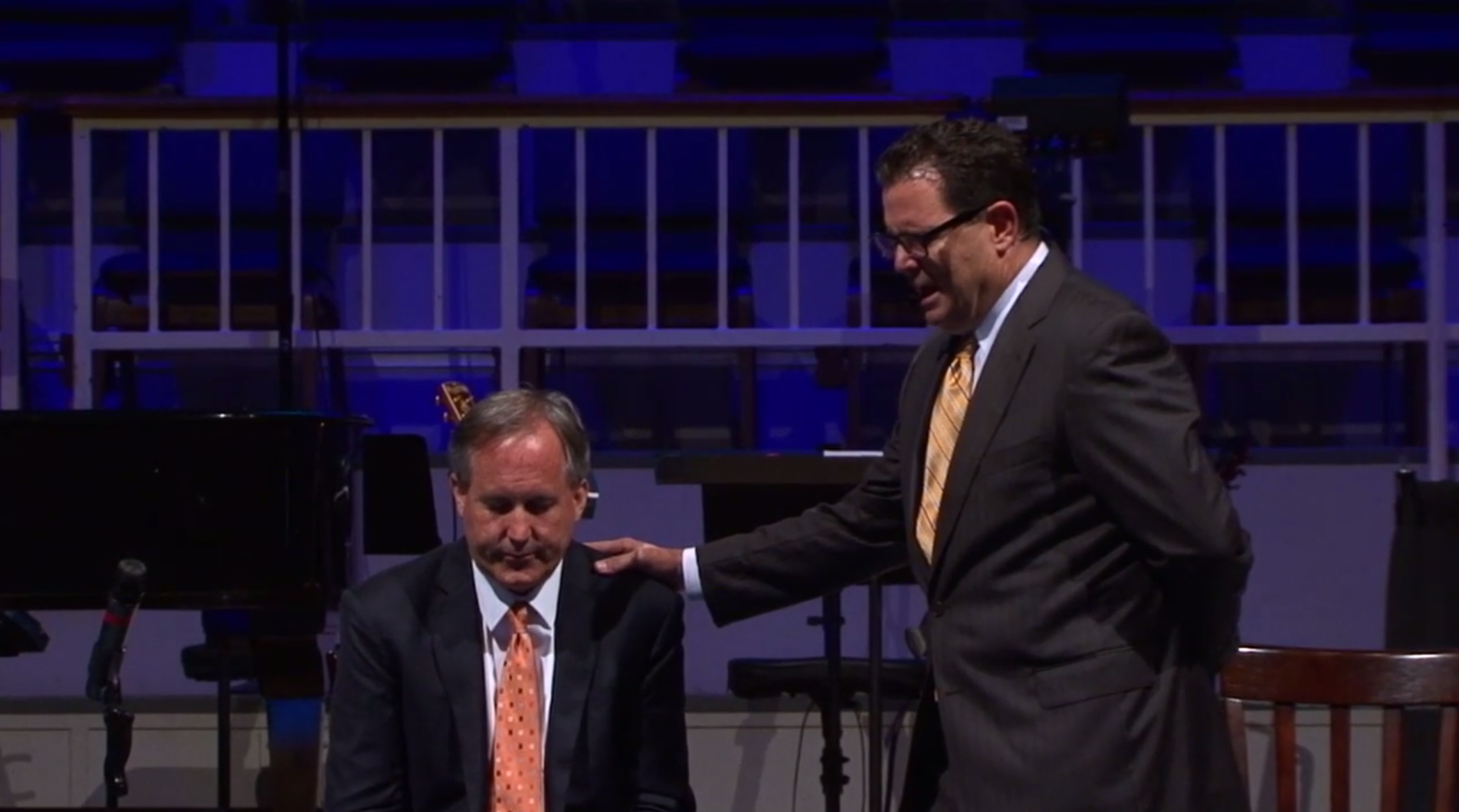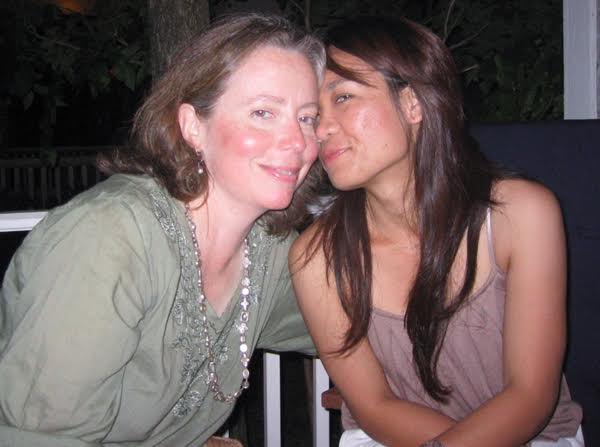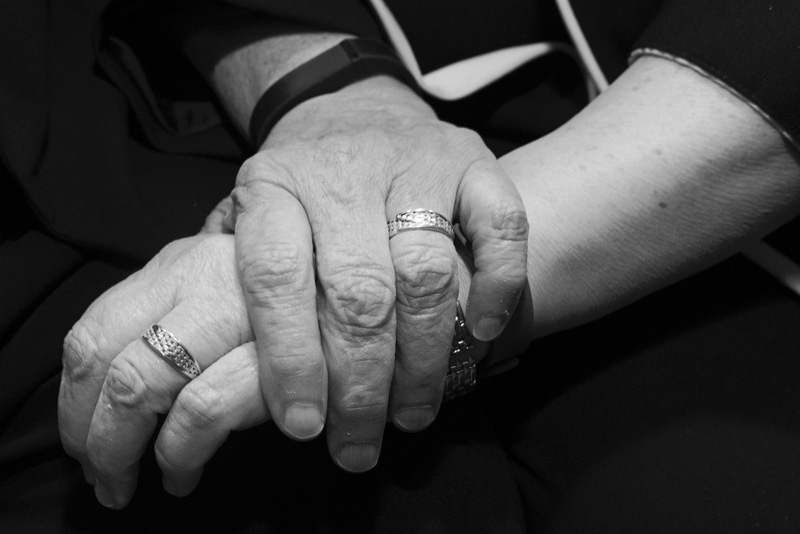
State of Denial
Legally married in other states, many same-sex couples in Texas face an uncertain future at home.
A version of this story ran in the July 2014 issue.
Editor’s Note, February 2023: It is against the policy of the Texas Observer to take down our published content. However, we have made a rare exception and removed two participants from this article who reported facing a surge of harassment because of their participation in this nearly 9 year old project. In our opinion, this is a sad reflection on the state of LGBTQIA+ rights in Texas and the United States. We regret that we felt no choice but to take this step in order to protect a family.—Kit O’Connell
In 2012, my wife, Kate, and I traveled more than 3,400 miles from Austin and back to marry legally in New York City. Seven years earlier, in November 2005, our fellow Texas voters had approved Proposition 2, amending the Texas Constitution to declare that “Marriage in this state shall consist only of the union of one man and one woman,” thereby banning same-sex marriage within the state’s borders.
Like other same-sex couples who live in Texas, we are denied access to 1,138 federal rights, benefits and privileges because our marriage is not recognized here. That list, tallied in a 2003 report by the General Accounting Office, includes Social Security, military and veterans’ benefits, employment rights, and immigration and naturalization privileges.
In the eyes of Texas, Kate is not my next of kin. To approximate the status that a legally recognized marriage would confer, our attorney has recommended that we file six different contracts: a medical power of attorney and Health Insurance Portability and Accountability Act release; statutory durable power of attorney; declaration of guardian; directive to physicians; appointment of agent to control disposition of remains; and a last will and testament.
We have recently begun trying to become parents. Kate will be the birth mother. A lawyer has been necessary in this process as well. Months ago we started discussing the paperwork that will be required for me to adopt our child. We discovered that even after I file this paperwork, am screened and declared a fit mother by Child Protective Services, and appear in front of a judge, my name can never appear on our child’s birth certificate due to Texas Health and Safety Code 192.008, which states, “The supplementary birth certificate of an adopted child must be in the names of the adoptive parents, one of whom must be a female, named as the mother, and the other of whom must be a male, named as the father.”
On Oct. 28, 2013, lawyers in San Antonio filed a federal lawsuit, De Leon v. Perry, on behalf of two same-sex couples: Cleopatra De Leon and Nicole Dimetman (featured in this photo essay), and Mark Phariss and Vic Holmes.
In February 2014, U.S. District Judge Orlando Garcia ruled that Texas laws prohibiting same-sex marriage are unconstitutional. The judge also issued a stay on his ruling pending appeal, so same-sex couples will not immediately be allowed to receive marriage licenses. Texas Attorney General Greg Abbott said shortly after the ruling that the state will appeal the decision to the 5th Circuit Court of Appeals.
Since I started writing this introduction on May 18, 2014, two more states—Oregon and Pennsylvania—have joined California, Connecticut, Delaware, Hawaii, Illinois, Iowa, Maine, Maryland, Massachusetts, Minnesota, New Hampshire, New Jersey, New Mexico, New York, Rhode Island, Vermont, Washington and Washington, D.C. in affirming the right of same-sex couples to marry.
Utah, Oklahoma, Virginia, Kentucky, Michigan, Wisconsin and Texas are awaiting appellate court decisions on lower court rulings in favor of same-sex marriage.
For this photo essay, I visited six couples whose legal marriages are not recognized in Texas to see what life is like for them and their families.
As a documentarian I have visited with and shared the stories of many people, but this is the first time I’ve worked on a project where the people I photograph and I are facing the same issues. Prior to embarking on this project, I was intellectually aware of the rights and privileges that Kate and I are denied as Texas residents, but the financial and logistical burdens we bear in search of adequate, if not equal, protection have become all the more real in the course of sharing them with other couples facing the same predicament.
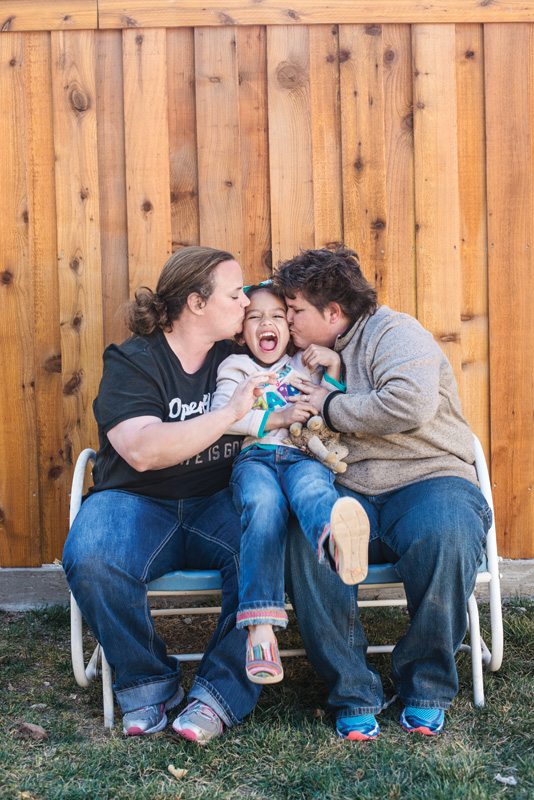
Kristi Grady and Rissy Walker
Current residence: Amarillo
Years together: 15
Legally married in: Santa Fe, New Mexico, 2014
Kristi and Rissy met as social workers for Child Protective Services. Kristi is the birth mother of their daughter, who was adopted by Rissy in 2013. The couple is currently working with an attorney and the Bureau of Vital Statistics to resolve irregularities regarding their daughter’s birth certificate.
Kristi: “You know that soccer team she plays for wants her birth certificate, let alone the schools, the doctors’ offices. We went to our attorney’s office after the adoption to get the paperwork done, and that’s when our attorney found out that, hey, we just did this legal adoption in Texas and we weren’t getting a birth certificate. Everybody else can go to the courthouse, pay $21 and get a copy of the birth certificate. Hers is invalid. We have only the first [invalidated] one that was sent to me, with my name on it, right from the hospital. That’s it. And that’s scary, and so we carry adoption papers with us. They’re in every car, they’re at the school, they’re in her office, they’re in my purse. You want to talk about an extra expense because you’re gay—those suckers cost $25 apiece. We have them everywhere.”
Rissy: “[For the adoption] I had to have a home study completed, even though I raised this baby. Even though I was the first person to hold her. I’ve been with her since the first second she was born. We had to have a counselor come to the house to see if I was now a suitable parent after raising her for five years. But we did it anyway, and then we had the adoption. But I think the most offensive thing to me during this was that the home study lady’s most important question, the one she kept going back to over and over and over again, was, ‘How many times a week do you have sex?’ She didn’t check the house, she didn’t check anything. That’s what was most offensive to us as social workers.”
Kristi: “Texas can’t take anything more away from me than they already have. But they will not treat [our daughter] differently. … That’s when Rissy and I got political. We were completely happy to be here in our little house, with our little dogs, on our little cul-de-sac, until I found out I couldn’t get her birth certificate. Yeah, you can treat us differently, we’re used to it. We grew up here, we know. But you’re not going to treat our baby different.”
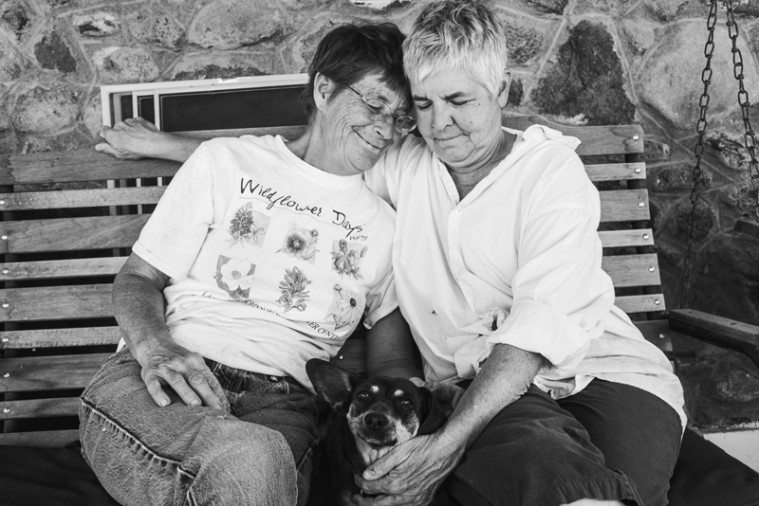
Patty Manning and Cyndi Wimberly
Current residence: Alpine
Years together: 21
Legally married in: New York City, 2014
Cyndi and Patty met as graduate students studying biology at Sul Ross University in Alpine. Cyndi has three children from a previous marriage.

Patty: “We intend to be with each other for the rest of our lives, and it’s nice to have a piece of paper that says it’s legal. … As far as Alpine, I have never felt threatened in Alpine, ever. And I’ve been pretty out, and since we’ve been together we’ve both been pretty out. We haven’t hidden our relationship from anyone.”
Cyndi: “And there’s a real mix of conservatives and liberal people who live here, and a lot of religious folks, and even those folks, it’s real ‘live and let live’ here. It really is.”
Patty: “As Texas-lovin’ as we both are, it would have been so much nicer to be able to get married here. I think it would have been a lot better to have a wedding here in Alpine where our friends are, who are so supportive. I think our friends would have really enjoyed being a part of it, and we would have liked having them there. Cyndi’s a fourth-generation Texan and I’m only a third, but I’m a Texan, just as good as anybody else, and I like that in my history. I adore Texas, for whatever reason, and some of our closest friends who aren’t Texans don’t understand it. There’s a Texas mystique. It would have been that much more meaningful to be able to get married in the state we love. I’m sure there are other places to live that are better in some ways than Texas, but I don’t want to live anywhere else.”
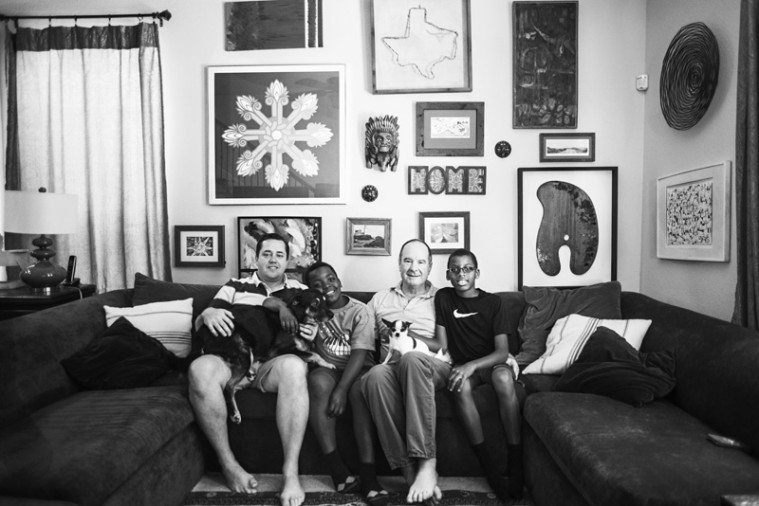
John and Stephen Wright
Current residence: Austin
Years together: 13
Legally married in: Santa Cruz, California, 2013
John and Stephen met in 2001 and had a commitment ceremony in 2002. They adopted their first son, Eli, in 2004, and their second son, Simon, in 2006. Two years ago Stephen was diagnosed with Stage 4 cancer.
Stephen: “It was tough at first, and everything in our life changed after [the diagnosis] because they told us we had a very short period of time, and so we got very busy downsizing everything and putting everything in order and trying to make sure everything would be right. It’s been scary for [Eli and Simon] and scary for us, but right now it’s been a calm period of time and things seem to be stable, if we can figure out the crazy health insurance situation. I’m a real estate broker and I have to have private insurance, and my private insurance company’s done everything they could do to dodge staying with me. After two years on disability, I’ve become eligible for Medicare. In Texas, especially, if you are under 65 and on disability, you’re not offered the full range of Medicare products. It’s a big penalty if I refuse the Medicare, but then I’d have to wait a minimum of six months to get it back if the insurance company I have now were to do something. If we were married in Texas legally, then I could be on his health insurance, and it would make a tremendous difference. If I was on an employer-provided insurance as his spouse, then I could refuse the Medicare even though I’m on disability, and then we could go on like we’re going and any time it became necessary for me to go on Medicare, I could do it immediately.”
John: “Until you’re in that situation, you don’t know what you’re missing out on or what you don’t have, and since we’ve never been legally recognized in Texas, I’m guessing there’s lots of rights and privileges and responsibilities that we have no idea. I think inevitably that [legal recognition in Texas] is going to come. And do you know what else helps us? The big companies. Our auto insurance? We’re a couple. Our homeowner’s insurance? We’re a couple. For me, I think our legal marriage in California didn’t make me feel any different, but I think the difference of marriage being a United States-wide phenomenon for gay people will be [the end of] this constant refrain that gay people have always had, even the most self-assured gay people, that voice in your head, that ‘less than’ feeling. You can’t tell me that this is not as significant a relationship as anyone’s. When you want to commit to love someone for the rest of your life—it seems like the strangest reason to discriminate.”
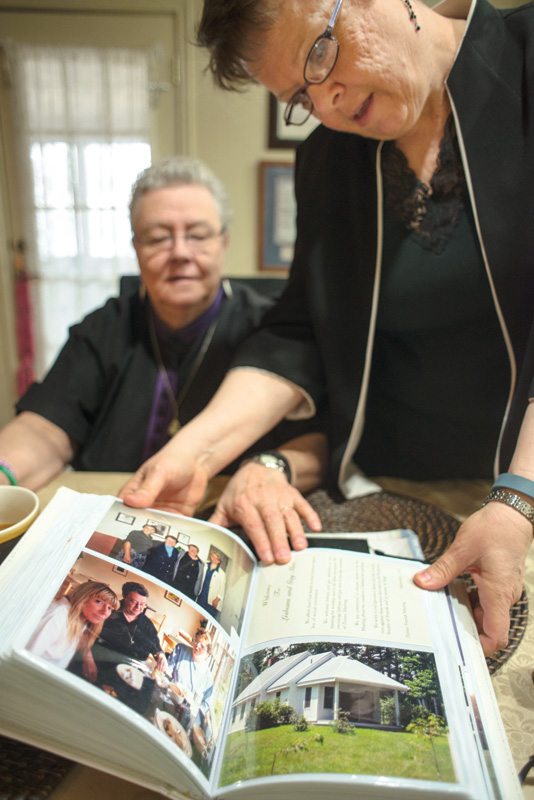
Reverend Margaret Walker and Monica Warn
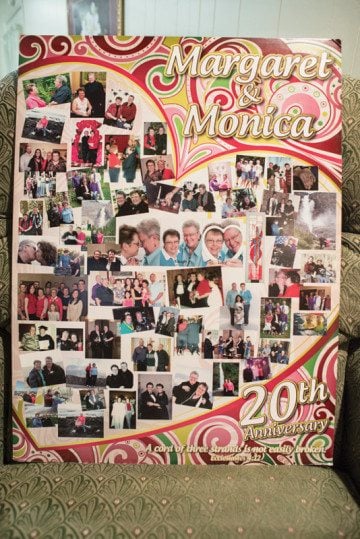
Current residence: Abilene
Years together: 22
Legally married in: British Columbia, Canada, 2005
Margaret and Monica both have children from previous marriages; Margaret has two sons, and Monica has one son. They were neighbors when they met. They’ve held multiple ceremonies to declare their commitment to each other, including a 1992 church service to “make God a part of the relationship” and a 2001 civil union in Vermont.
Monica: “That line where it ceased being Canada, there was actually a physical line. I remember we held hands and looked at that line for a long time. And then we stepped across. Just the atmosphere of a nation, you know, that accepts and values you and gives you the same civil rights that everyone else has, and what that feels like to be in a country like that. The freedom that you feel, the protection that you feel. To step over that, it’s always very emotional for us.”
Margaret: “I think one of the things I think about, as far as being married and not being recognized in Texas, is, what if when we get older we end up in a nursing home? I don’t want to live in a room without her, and yet they could do that. They could separate us. That crosses my mind too often. That might be a separation that I don’t want to endure.”
Monica: “When people get married in the state of Texas, 1,138 rights come with that marriage license which we are denied. And because of that we paid an attorney about $2,500 to get seven documents. … We have those seven documents that we hope will be protection for anything that comes up, but I think there’s always that fear that hangs over you that maybe there’s something that we haven’t thought of, or that hadn’t been encountered by anybody else, that may come up and you don’t have any protections. … I carry my marriage certificate with me because I just think it’s a little protection. Sometimes I just like to pull it out and look at it because I never thought that I would see this in my lifetime, to actually be able to marry. I view that piece of paper as a treasure. She’s the love of my life.”
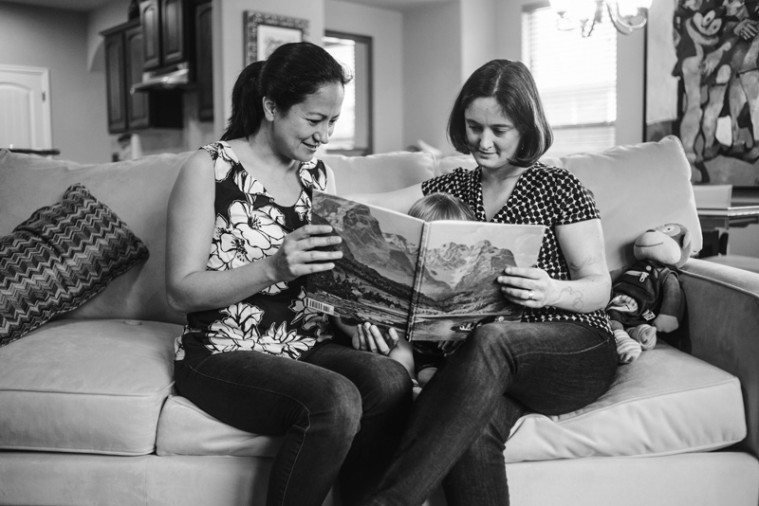
Cleopatra De Leon and Nicole Dimetman
Current residence: Austin
Years together: 13
Legally married in: Boston, Massachusetts, 2009
Nicole and Cleo met through mutual friends in San Antonio. Cleo gave birth to their son, who was conceived via in vitro fertilization, and Nicole adopted him. They are one of two couples who filed a 2013 federal lawsuit challenging Texas’ ban on same-sex marriage.
Nicole: “[When we were discussing having children] we thought, ‘Do we get married now even though it’s not legal in our own state?’ We knew we wanted to have kids, but we didn’t want to have kids and not be married. We’re both pretty traditional people. There’s just no way we’re going to have kids out of wedlock, and I wanted to be able to tell [our son] that we’re as married as we can possibly be. … She had an inordinately hard labor, a C-section that wasn’t planned. It became an emergency. For about 30 minutes we didn’t know what was going to happen.”
Cleo: “It only comes up in some of the most vulnerable times. During the labor and delivery—you can’t adopt a child while he or she is in utero, so if something had happened … they become essentially orphans, they don’t have a second parent. The [legal arrangements] that we had, she could make decisions for me. She couldn’t make health decisions for him. We didn’t even think of that. You don’t think about those things. You think that you’re covered, you talk to your lawyer, you’ve got everything filed and prepared and ready, and then you’re in this situation and all of a sudden it dawns on you, ‘Oh my God.’ It really drove home the need to change the laws in this state. … So we are vulnerable, and that’s one of the reasons why we feel so strongly about the lawsuit that we’re in. We want to make sure that all the default laws that are afforded to different-sex couples are given to us as well, because we’re a family and we feel that if the state really wants to promote responsible procreation, then why are you making it harder for us?”
Nicole: “You don’t have an accidental kid in a gay relationship. There is so much intention and planning that goes into having a kid. There’s nothing irresponsible about that.”
To support journalism like this, donate to the Texas Observer.
